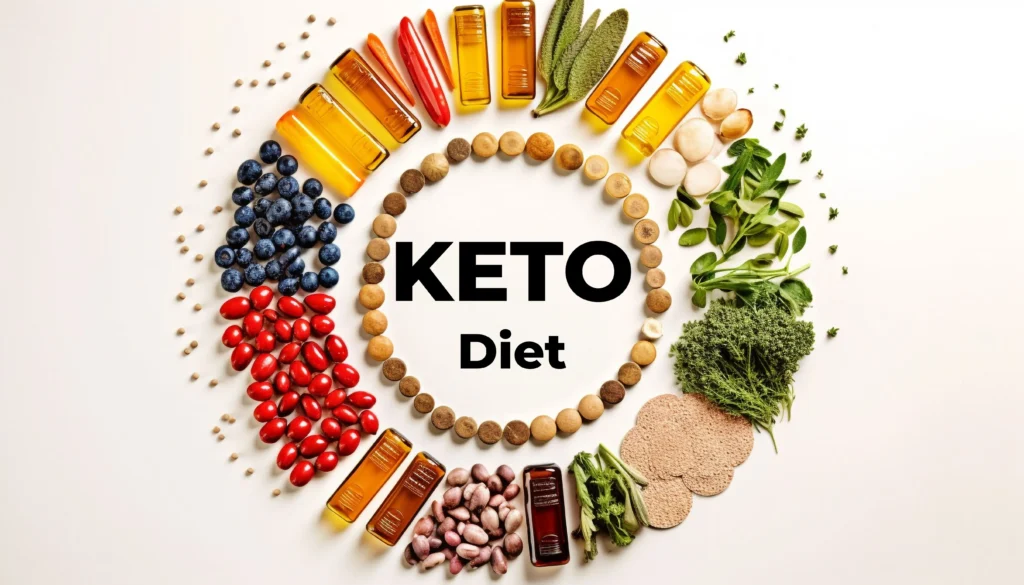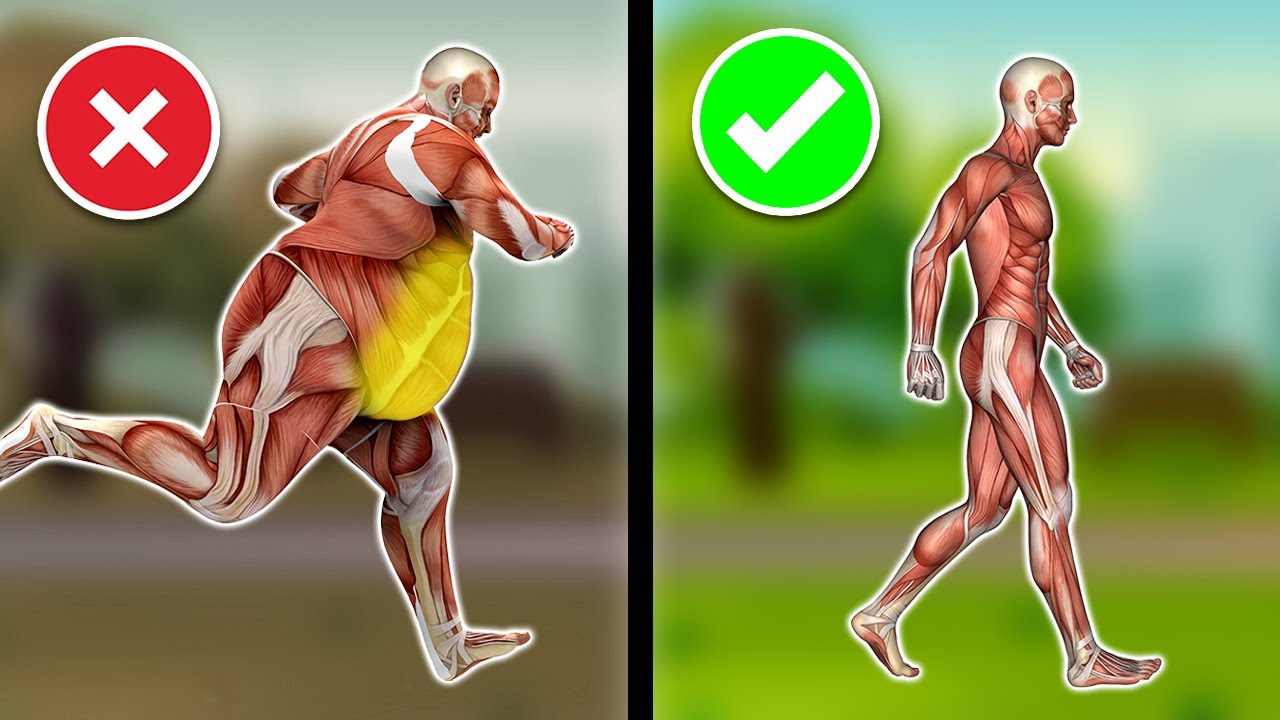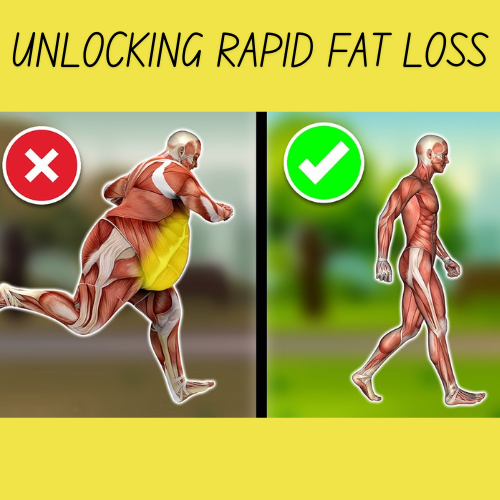How to Lose Weight Fast Naturally and Permanently: Losing weight naturally and permanently is a goal for many individuals seeking a healthier lifestyle. With numerous fad diets and quick-fix solutions flooding the market, it can be challenging to discern which methods are truly effective and sustainable. However, by incorporating a combination of healthy habits into your daily routine, you can achieve your weight loss goals in a safe and lasting manner.

Lose Weight Fast Naturally and Permanently
- Trying Intermittent Fasting: Intermittent fasting (IF) involves cycling between periods of eating and fasting, with various methods such as the 16/8 method or the 5:2 approach. During fasting periods, the body taps into stored fat for energy, leading to potential weight loss. Additionally, IF may improve metabolic health by enhancing insulin sensitivity and promoting cellular repair processes. However, it’s essential to maintain adequate nutrition during eating windows and consult a healthcare professional before starting IF, especially for individuals with underlying health conditions for Lose Weight Fast Naturally and Permanently.
- Tracking Your Diet and Exercise: Keeping a detailed record of food intake and physical activity can provide valuable insight into calorie consumption and expenditure. By tracking meals and workouts, individuals can identify patterns, monitor progress, and make necessary adjustments to achieve weight loss goals effectively. Numerous mobile apps and online tools are available to simplify the tracking process, making it accessible for individuals of all ages and lifestyles.
- Eating Mindfully: Mindful eating involves being present and attentive while consuming food, focusing on the sensory experience and internal hunger cues. By slowing down and savoring each bite, individuals can enhance awareness of portion sizes, prevent overeating, and develop a healthier relationship with food. Mindful eating practices may include chewing food thoroughly, minimizing distractions during meals, and acknowledging feelings of hunger and satiety.
- Eating Protein with Meals: Including protein-rich foods such as lean meats, poultry, fish, legumes, and tofu in meals can promote feelings of fullness and satiety. Protein requires more energy to digest compared to carbohydrates and fats, leading to a temporary increase in metabolism known as the thermic effect of food. Additionally, protein helps preserve lean muscle mass during weight loss, preventing a decrease in metabolic rate and supporting long-term fat loss.
- Cutting Back on Sugar and Refined Carbohydrates: Sugar and refined carbohydrates, found in sugary beverages, pastries, white bread, and processed snacks, contribute to rapid spikes in blood sugar levels and increased cravings. By reducing intake and opting for complex carbohydrates like whole grains, fruits, and vegetables, individuals can stabilize blood sugar levels, control appetite, and promote sustained energy throughout the day. This dietary shift may also reduce the risk of chronic diseases such as type 2 diabetes and cardiovascular disorders for Lose Weight Fast Naturally and Permanently.
- Eating Plenty of Fiber: Fiber is a crucial component of a healthy diet, aiding in digestion, promoting satiety, and supporting weight management. Soluble fiber, found in foods like oats, beans, apples, and flaxseeds, absorbs water and forms a gel-like consistency in the digestive tract, slowing down the emptying of the stomach and helping control hunger. Insoluble fiber, prevalent in vegetables, whole grains, and nuts, adds bulk to stools and supports regular bowel movements. By incorporating fiber-rich foods into meals and snacks, individuals can increase feelings of fullness, regulate appetite, and improve overall digestive health.
- Balancing Gut Bacteria: The gut microbiome, composed of trillions of bacteria and other microorganisms, plays a vital role in digestion, metabolism, and immune function. Imbalances in gut bacteria have been linked to obesity and metabolic disorders. Consuming probiotic-rich foods like yogurt, kefir, sauerkraut, and kimchi, as well as prebiotic foods such as garlic, onions, bananas, and asparagus, can help maintain a healthy balance of gut bacteria. Supporting gut health may enhance nutrient absorption, reduce inflammation, and contribute to weight loss efforts.
- Getting a Good Night’s Sleep: Adequate sleep is essential for overall health and well-being, including weight management. Sleep deprivation can disrupt hormone levels, increasing hunger hormones like ghrelin and decreasing satiety hormones like leptin, leading to increased appetite and cravings for high-calorie foods. Additionally, insufficient sleep may impair decision-making and impulse control, making it challenging to adhere to healthy eating habits and exercise routines. Prioritizing quality sleep by establishing a consistent bedtime routine, creating a comfortable sleep environment, and practicing relaxation techniques can support weight loss efforts and promote optimal health.
- Managing Stress Levels: Chronic stress triggers the release of cortisol, a hormone associated with increased appetite, cravings, and abdominal fat deposition. Stress eating, characterized by the consumption of high-calorie, comfort foods in response to emotional distress, can sabotage weight loss goals and contribute to unhealthy eating patterns. Implementing stress-reducing strategies such as mindfulness meditation, deep breathing exercises, regular physical activity, and spending time in nature can help mitigate stress levels and promote emotional well-being. By addressing stressors and adopting healthy coping mechanisms, individuals can better manage their weight and overall health.
- Adding Protein to Your Diet: Protein is an essential nutrient that plays a crucial role in various bodily functions, including muscle repair and growth, hormone production, and immune function. Incorporating adequate protein into meals and snacks can help individuals feel full and satisfied, reducing the likelihood of overeating and promoting weight loss. Sources of protein include lean meats, poultry, fish, eggs, dairy products, legumes, tofu, tempeh, and protein-rich grains like quinoa. By including protein with each meal and snack, individuals can support muscle retention, boost metabolism, and optimize body composition during weight loss.
- Prioritizing Whole, Single-Ingredient Foods: Whole foods are minimally processed and retain their natural nutrients, fiber, and phytochemicals, making them nutrient-dense and beneficial for overall health. Examples of whole foods include fruits, vegetables, whole grains, lean proteins, nuts, seeds, and legumes. Choosing whole, single-ingredient foods over highly processed alternatives can help individuals reduce calorie intake, improve nutrient absorption, and support weight loss efforts. Whole foods are also more filling and satisfying than processed foods, making it easier to control portion sizes and maintain a healthy diet long term.
- Limiting Processed Foods: Processed foods undergo extensive processing and often contain added sugars, unhealthy fats, sodium, and artificial additives. Regular consumption of processed foods has been linked to weight gain, inflammation, and an increased risk of chronic diseases. By limiting intake and opting for whole, minimally processed alternatives, individuals can reduce calorie consumption, improve nutrient intake, and enhance overall health. Examples of processed foods include sugary snacks, packaged desserts, fast food, sugary beverages, and pre-packaged meals. Reading ingredient labels and choosing foods with simple, recognizable ingredients can help individuals make healthier choices and support their weight loss goals for Lose Weight Fast Naturally and Permanently.
- Stocking up on Nutritious Foods and Snacks: Having nutritious foods and snacks readily available can help individuals make healthier choices and avoid impulsive eating. Stocking the pantry, refrigerator, and workplace with fresh fruits, vegetables, lean proteins, whole grains, nuts, seeds, and healthy snacks can facilitate healthier eating habits and support weight management goals. Preparing and portioning snacks in advance can also help individuals control portion sizes and avoid overeating. Examples of nutritious snacks include Greek yogurt with berries, carrot sticks with hummus, apple slices with almond butter, and air-popped popcorn. By creating a supportive environment filled with nutritious options, individuals can make healthier choices and achieve their weight loss goals more effectively.
- Limiting Your Intake of Added Sugar: Added sugars contribute to excess calorie intake without providing essential nutrients, leading to weight gain and an increased risk of chronic diseases such as obesity, type 2 diabetes, and heart disease. Common sources of added sugars include sugary beverages, candy, baked goods, flavored yogurt, and processed snacks. By reducing consumption of foods and beverages high in added sugars, individuals can lower calorie intake, stabilize blood sugar levels, and improve overall health. Opting for naturally sweet foods like fruits and using alternative sweeteners like stevia or monk fruit can satisfy cravings for sweetness while supporting weight loss goals.
- Drinking Water: Staying hydrated is essential for overall health and can support weight loss efforts in several ways. Drinking water before meals can help individuals feel full and reduce calorie intake during meals. Additionally, replacing sugary beverages like soda and juice with water can significantly reduce calorie consumption and promote weight loss. Water also plays a vital role in metabolism, digestion, and nutrient absorption, making it essential for optimal health and well-being. Aim to drink at least 8-10 glasses of water per day, and adjust intake based on individual needs, activity level, and climate.
- Drinking (Unsweetened) Coffee: Coffee is a popular beverage that contains caffeine, a natural stimulant that can temporarily increase metabolism and promote fat burning. Consuming coffee in moderation can boost energy levels, improve mental focus, and enhance athletic performance during workouts. However, it’s essential to limit added sugars and high-calorie additives like cream and syrup to prevent excess calorie intake. Opting for unsweetened coffee or adding a splash of unsweetened almond milk or cinnamon can enhance flavor without adding extra calories. Be mindful of caffeine sensitivity and avoid consuming coffee late in the day to prevent sleep disturbances.
- Supplementing with Glucomannan: Glucomannan is a type of soluble fiber derived from the root of the konjac plant. It has gained popularity as a dietary supplement for weight loss due to its ability to absorb water and expand in the stomach, promoting feelings of fullness and reducing appetite. Glucomannan supplements are available in capsule or powder form and can be taken before meals to support weight loss efforts. It’s essential to drink plenty of water when taking glucomannan supplements to prevent dehydration and ensure proper digestion. While glucomannan may aid in weight loss when combined with a healthy diet and lifestyle, it’s essential to consult with a healthcare professional before starting any new supplement regimen.
- Limiting Liquid Calories: Liquid calories from sugary beverages like soda, fruit juice, energy drinks, and sweetened coffee drinks can contribute to excess calorie intake and weight gain. These beverages often contain added sugars and offer little to no nutritional value, making them easy to overconsume. By replacing sugary drinks with water, herbal tea, or unsweetened beverages, individuals can significantly reduce calorie intake and support weight loss goals. Opting for beverages that hydrate the body without adding extra calories can promote overall health and help individuals maintain a healthy weight.
- Limiting Your Intake of Refined Carbs: Refined carbohydrates, such as white bread, white rice, pasta, pastries, and sugary cereals, undergo extensive processing that removes the bran and germ layers, stripping away fiber, vitamins, and minerals. This process results in a product that is quickly digested and absorbed, leading to rapid spikes in blood sugar levels and increased hunger shortly after consumption. Over time, excessive consumption of refined carbs can contribute to weight gain, insulin resistance, and metabolic disorders.
- Fast Intermittently in Cycles: Intermittent fasting (IF) involves alternating between periods of eating and fasting, with various approaches such as the 16/8 method, 5:2 method, or alternate-day fasting. Fasting periods may range from several hours to a full day or more, depending on the chosen method and individual preferences. During fasting periods, the body switches from using glucose as its primary fuel source to burning stored fat for energy, which may result in weight loss over time.
- Drinking (Unsweetened) Green Tea: Green tea is a popular beverage that contains antioxidants called catechins, which have been shown to boost metabolism and promote fat burning. Drinking green tea regularly may help increase energy expenditure and facilitate weight loss, especially when combined with a healthy diet and regular exercise. Opt for unsweetened green tea to avoid added sugars and unnecessary calories.
- Eating More Fruits and Vegetables: Fruits and vegetables are rich in essential nutrients, vitamins, minerals, antioxidants, and dietary fiber, making them valuable components of a healthy diet. Incorporating a variety of colorful fruits and vegetables into meals and snacks can help increase satiety, reduce calorie intake, and promote weight loss. Aim to fill half your plate with fruits and vegetables at each meal to maximize nutrient intake and support overall health.
- Counting Calories Once in a While: While calorie counting is not necessary for everyone, periodically tracking calorie intake can provide valuable insight into eating habits, portion sizes, and overall energy balance. By monitoring calorie consumption and expenditure, individuals can make informed decisions about food choices, portion sizes, and meal timing to support their weight loss goals. However, it’s essential to approach calorie counting with flexibility and balance, focusing on nutrient-dense foods and overall dietary patterns rather than strict calorie restriction.
- Using Smaller Plates: Using smaller plates and bowls can help control portion sizes and prevent overeating by creating visual cues that signal satiety. Research suggests that individuals tend to consume larger portions when presented with larger plates, regardless of hunger or satiety cues. By downsizing plate and bowl sizes, individuals can reduce calorie intake without feeling deprived or hungry, supporting weight loss efforts and promoting healthier eating habits.
- Try a Low-Carb Diet: Low-carb diets, such as the ketogenic diet or Atkins diet, restrict carbohydrate intake while emphasizing protein and healthy fats. By reducing carb intake, the body enters a state of ketosis, where it burns fat for fuel instead of carbohydrates. This metabolic shift can lead to rapid weight loss, improved blood sugar control, and reduced appetite. However, it’s essential to choose nutrient-dense sources of protein and fat and monitor overall nutrient intake to ensure adequate nutrition while following a low-carb diet.
- Eat More Slowly: Eating slowly and mindfully can help individuals become more aware of their hunger and fullness cues, preventing overeating and promoting weight loss. Chewing food thoroughly, savoring each bite, and taking breaks between bites can give the brain time to register satiety signals and reduce the likelihood of consuming excess calories. Eating slowly can also enhance the enjoyment of meals and foster a healthier relationship with food, leading to more mindful eating habits in the long term.
- Add Eggs to Your Diet: Eggs are a nutrient-rich food that provides high-quality protein, vitamins, minerals, and antioxidants. Consuming eggs as part of a balanced diet can promote feelings of fullness, regulate appetite, and support weight loss goals. Additionally, eggs are versatile and easy to incorporate into meals and snacks, making them a convenient and nutritious option for individuals seeking to improve their diet and lose weight.
- Spice Up Your Meals: Adding herbs, spices, and seasonings to meals can enhance flavor without adding extra calories or sodium. Many herbs and spices, such as cinnamon, turmeric, cayenne pepper, and ginger, have been shown to have metabolism-boosting and appetite-suppressing properties. Experimenting with different flavor combinations can make meals more enjoyable and satisfying, reducing the need for added fats, sugars, and sauces.
- Take Probiotics: Probiotics are beneficial bacteria that promote a healthy gut microbiome and support digestive health. Consuming probiotic-rich foods like yogurt, kefir, sauerkraut, and kimchi, or taking probiotic supplements, can help maintain a balanced gut microbiota, which is essential for overall health and weight management. Probiotics may also reduce inflammation, improve nutrient absorption, and support immune function, contributing to a healthier body composition and improved well-being.
- Eat More Fiber: Dietary fiber is a type of carbohydrate found in plant foods that the body cannot digest or absorb. Fiber adds bulk to stools, promotes regular bowel movements, and helps regulate blood sugar levels and cholesterol levels. By including fiber-rich foods such as fruits, vegetables, whole grains, legumes, nuts, and seeds in your diet, you can increase feelings of fullness, reduce calorie intake, and support weight loss goals. Aim to consume a variety of fiber sources throughout the day to maximize health benefits and promote overall well-being.
- Brush Your Teeth After Meals: Brushing your teeth after meals can help signal the end of eating and reduce the temptation to snack or consume additional calories between meals. The minty flavor of toothpaste can also help curb cravings for sweet or high-calorie foods, making it easier to stick to healthy eating habits and support weight loss goals. Additionally, maintaining good oral hygiene is essential for overall health and can help prevent dental problems such as cavities and gum disease.
- Work to Overcome Food Addiction: Food addiction involves compulsive overeating and a loss of control over food intake, leading to weight gain and negative health consequences. By identifying triggers, developing coping strategies, and seeking support from healthcare professionals or support groups, individuals can overcome food addiction and establish healthier eating habits. Cognitive-behavioral therapy (CBT), mindfulness techniques, and stress management strategies can also be helpful in addressing underlying emotional and psychological factors contributing to food addiction and promoting long-term weight loss success.
- Do Some Sort of Cardio: Cardiovascular exercise, such as walking, running, cycling, swimming, or dancing, is an effective way to burn calories, improve cardiovascular health, and support weight loss. Engaging in regular cardio workouts can increase calorie expenditure, boost metabolism, and enhance fat burning, leading to improved body composition and overall fitness. Aim for at least 150 minutes of moderate-intensity aerobic activity or 75 minutes of vigorous-intensity aerobic activity per week, along with muscle-strengthening exercises on two or more days per week, to achieve optimal health benefits and weight loss results.
- Add Resistance Exercises: Resistance training, also known as strength training or weightlifting, involves using resistance to build muscle strength, endurance, and size. Incorporating resistance exercises into your workout routine can increase muscle mass, improve metabolism, and enhance fat burning, leading to more significant and sustainable weight loss results. Focus on compound exercises that target multiple muscle groups, such as squats, deadlifts, lunges, push-ups, and rows, to maximize calorie burn and muscle activation. Aim for at least two to three resistance training sessions per week, allowing for adequate rest and recovery between workouts.
- Focus on Changing Your Lifestyle: Sustainable weight loss requires long-term lifestyle changes that promote healthy eating, regular physical activity, stress management, adequate sleep, and overall well-being. Instead of focusing solely on short-term weight loss goals, prioritize adopting healthy habits that you can maintain for life. Set realistic, achievable goals, celebrate progress, and be patient with yourself throughout the journey. Remember that consistency, dedication, and perseverance are key to achieving lasting results and enjoying a healthier, happier lifestyle.
- Fasting in Cycles: Fasting in cycles involves alternating periods of fasting with periods of normal eating. This approach can help regulate calorie intake, improve insulin sensitivity, and promote fat loss. Popular fasting cycles include the 16/8 method, where individuals fast for 16 hours and eat during an 8-hour window, and alternate-day fasting, where individuals alternate between fasting and regular eating days. Fasting in cycles may also support cellular repair processes, enhance metabolic health, and increase levels of human growth hormone, which can aid in fat loss and muscle preservation. It’s essential to stay hydrated and nourished during fasting periods and consult a healthcare professional before starting any fasting regimen, especially for individuals with underlying health conditions or concerns.
- Mindful Eating: Mindful eating involves being fully present and attentive while consuming food, paying attention to hunger and satiety cues, and acknowledging thoughts and emotions related to eating. By practicing mindful eating techniques, such as eating slowly, savoring each bite, and avoiding distractions like screens or multitasking, individuals can develop a healthier relationship with food, reduce overeating, and make more conscious food choices. Mindful eating can also help individuals tune into their body’s hunger and fullness signals, leading to more intuitive eating habits and improved overall well-being.
- Setting Realistic Goals: Setting realistic, achievable goals is essential for successful weight loss and long-term weight management. Rather than aiming for rapid or extreme weight loss, focus on making gradual, sustainable changes to your diet, physical activity, and lifestyle habits. Break larger goals into smaller, manageable steps, and celebrate progress along the way. Set specific, measurable, and attainable goals that align with your values, preferences, and circumstances, and be flexible in adjusting your goals as needed based on feedback and results. By setting realistic expectations and adopting a positive mindset, you can maintain motivation, overcome obstacles, and achieve lasting success on your weight loss journey.
- Seeking Support and Accountability: Seeking support and accountability from friends, family members, or healthcare professionals can be instrumental in achieving weight loss goals. Surround yourself with individuals who encourage and support your efforts, and consider joining a weight loss group, enrolling in a fitness class, or working with a registered dietitian or personal trainer to receive guidance, motivation, and accountability. Sharing your progress, challenges, and successes with others can help keep you accountable, provide valuable feedback and encouragement, and reinforce healthy habits and behaviors. Building a supportive network of individuals who share similar goals and aspirations can increase your chances of success and make your weight loss journey more enjoyable and rewarding.
- Practicing Self-Compassion and Forgiveness: Practicing self-compassion and forgiveness is essential for maintaining a positive attitude and mindset throughout your weight loss journey. Be kind to yourself, acknowledge your efforts and accomplishments, and treat yourself with the same kindness and understanding you would offer to a friend or loved one. Embrace imperfection, learn from setbacks and mistakes, and let go of guilt or self-criticism. Recognize that weight loss is a challenging and sometimes unpredictable process, and focus on progress, growth, and resilience rather than perfection. By cultivating self-compassion and forgiveness, you can cultivate a healthier relationship with yourself, reduce stress and anxiety, and approach your weight loss goals with greater patience, resilience, and self-acceptance.
Also Read: 12 Effective Tips: Losing Face Fat Quickly
Internal Links
- How to Create a Balanced Diet Plan
- Myths and Facts About Losing Face Fat: Expert Guide
- Sculpt Your Face with Effective Face Exercises: Unlock Your Natural Beauty
External Links




